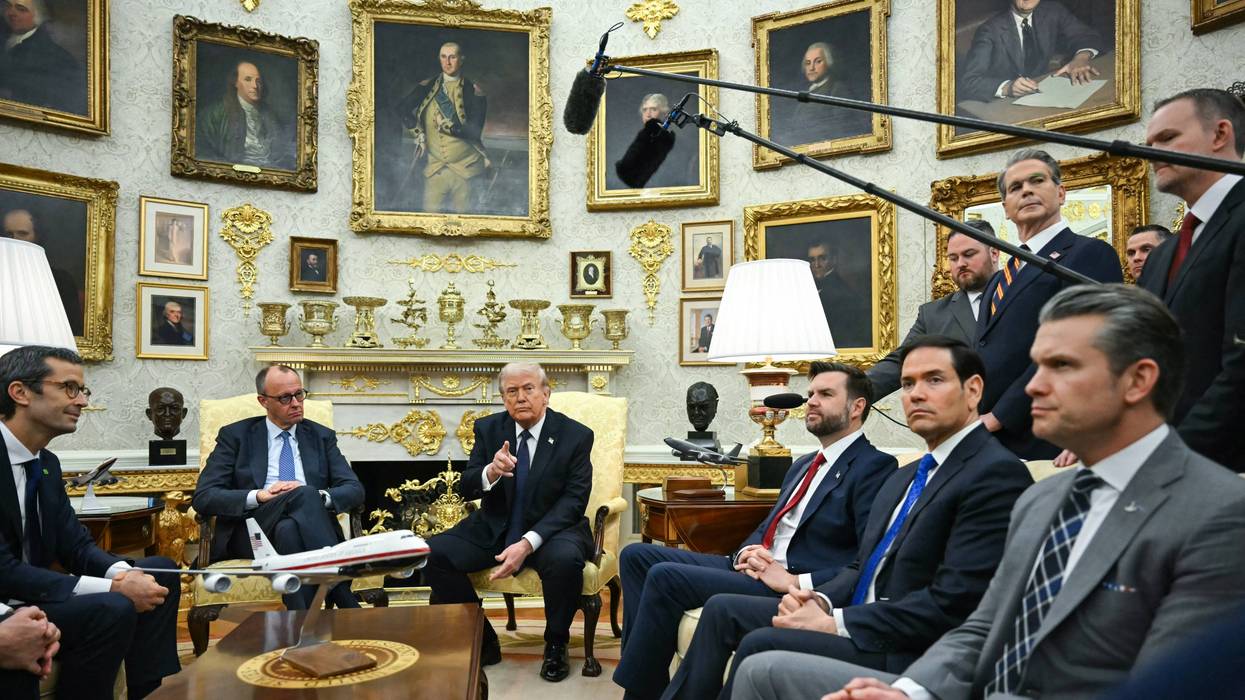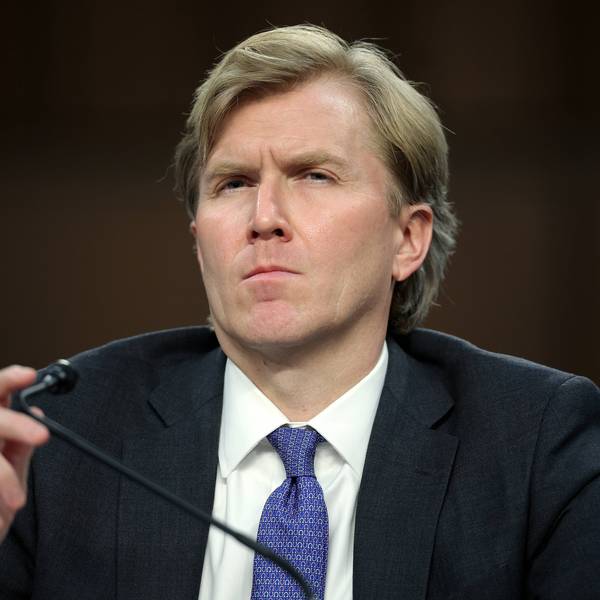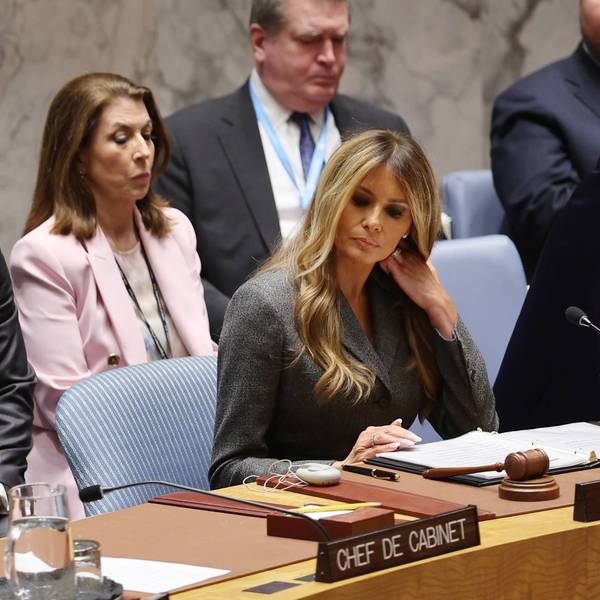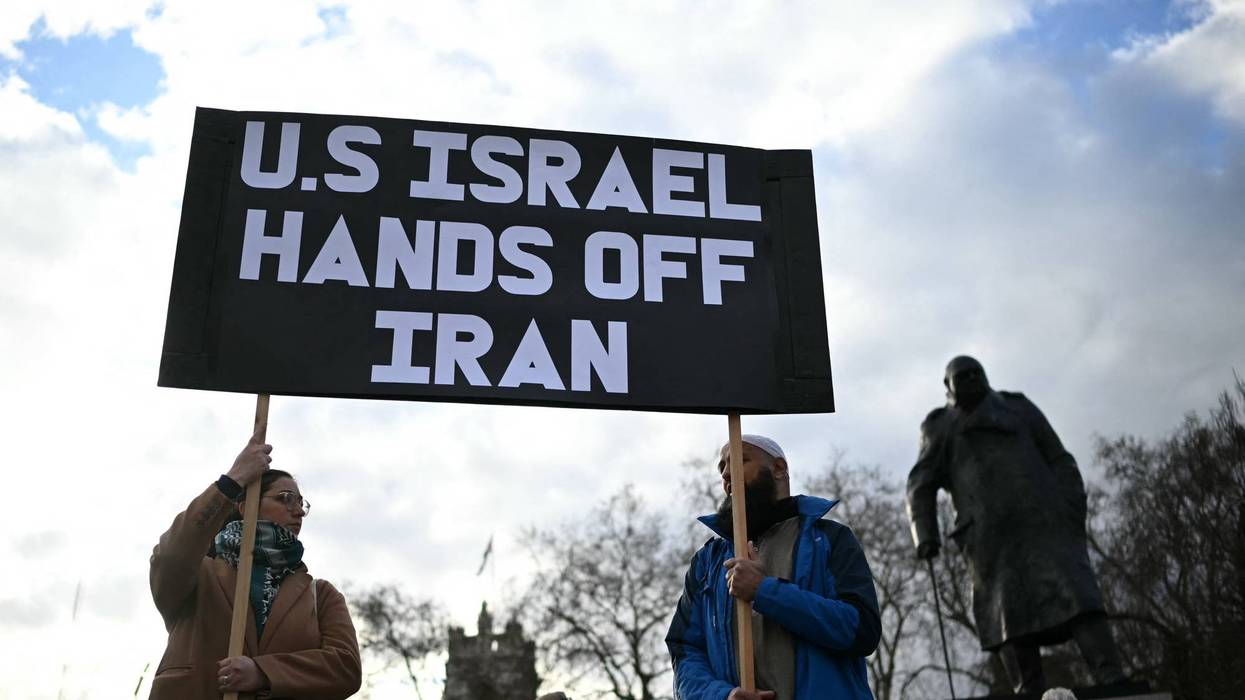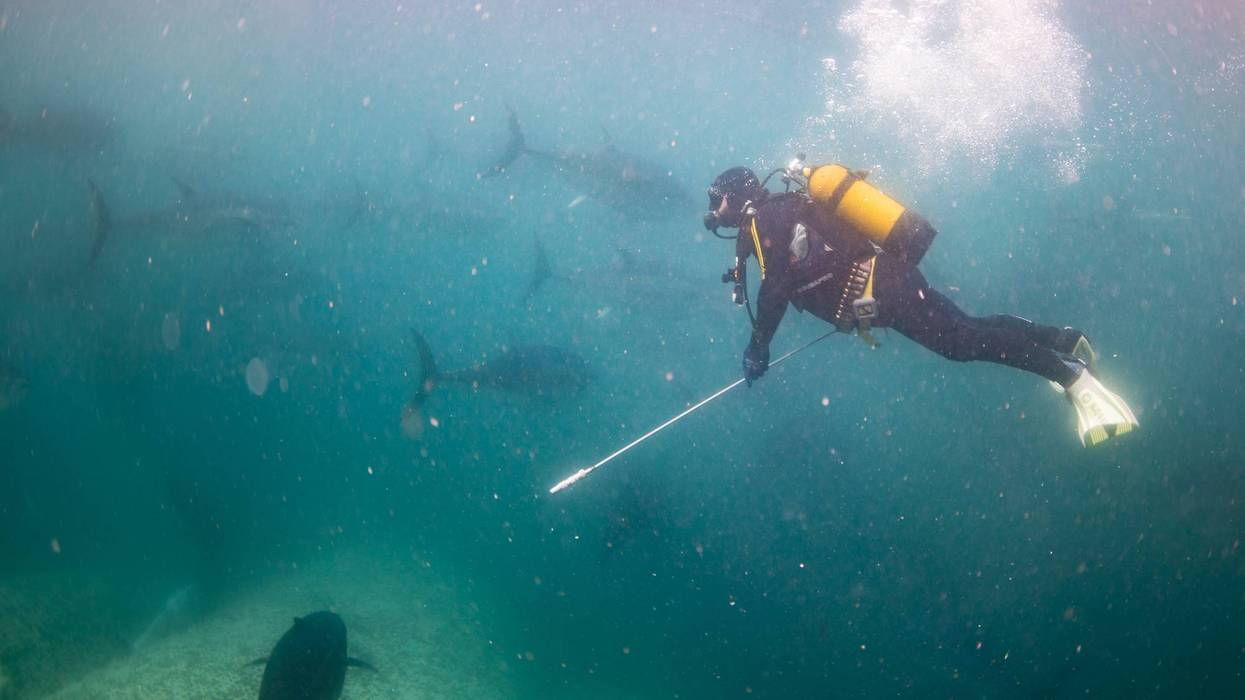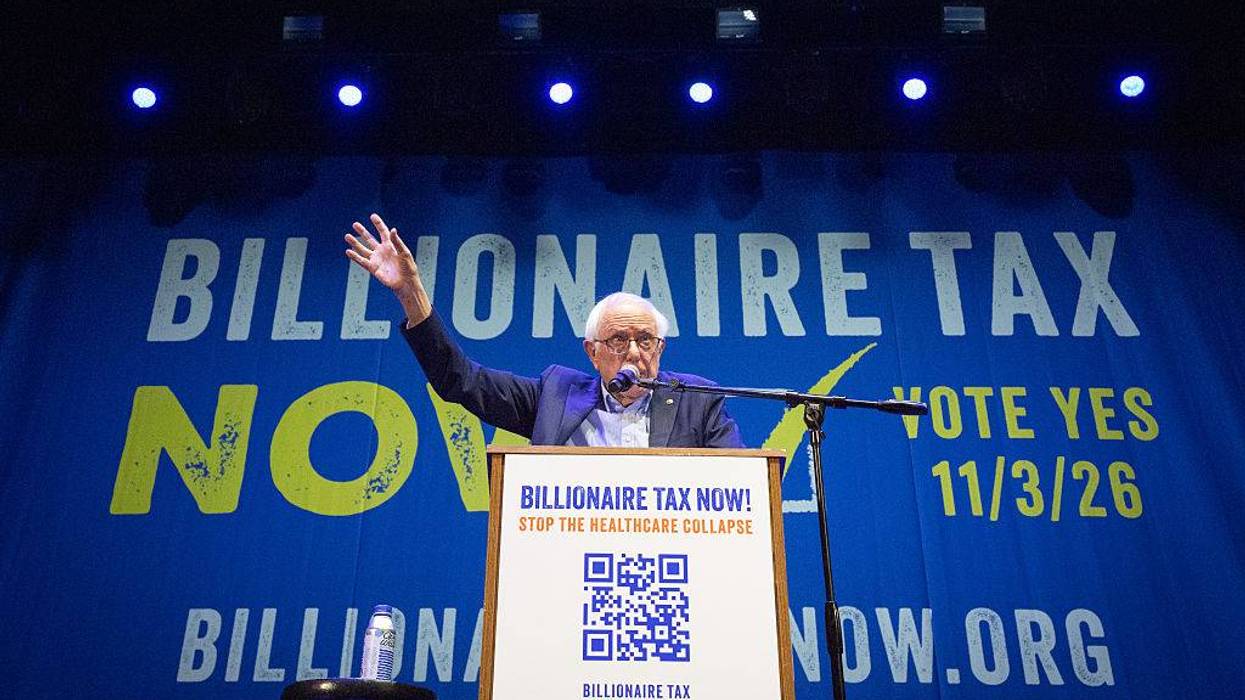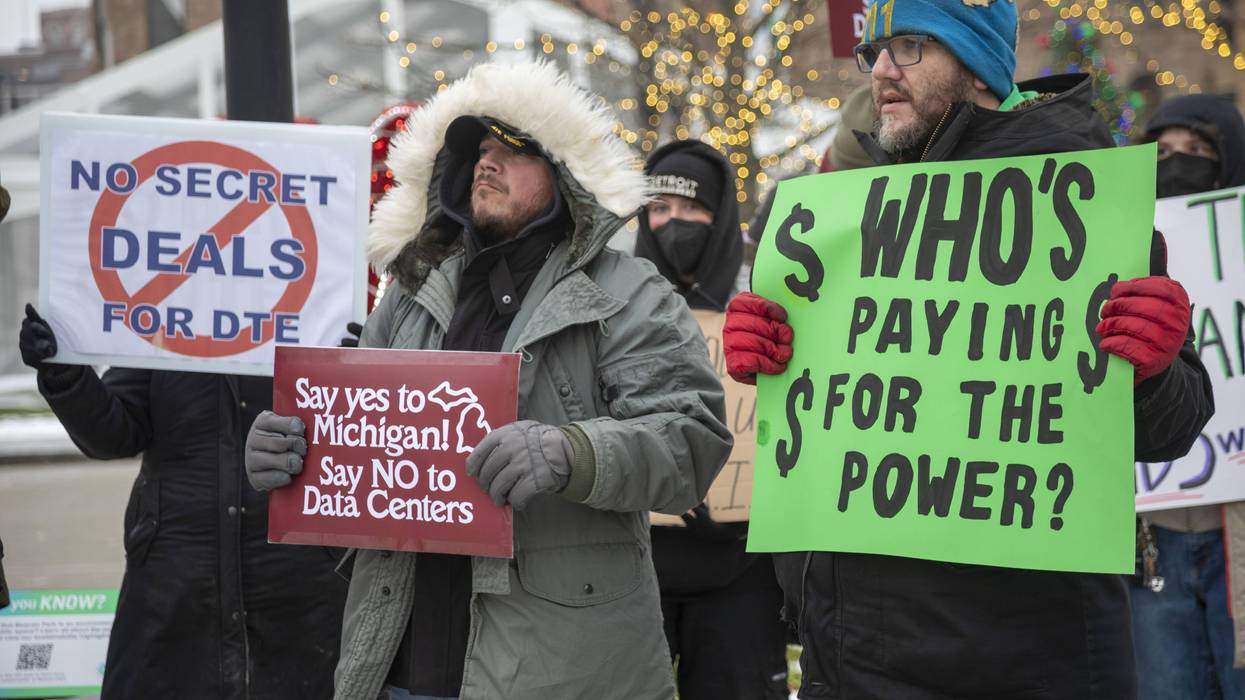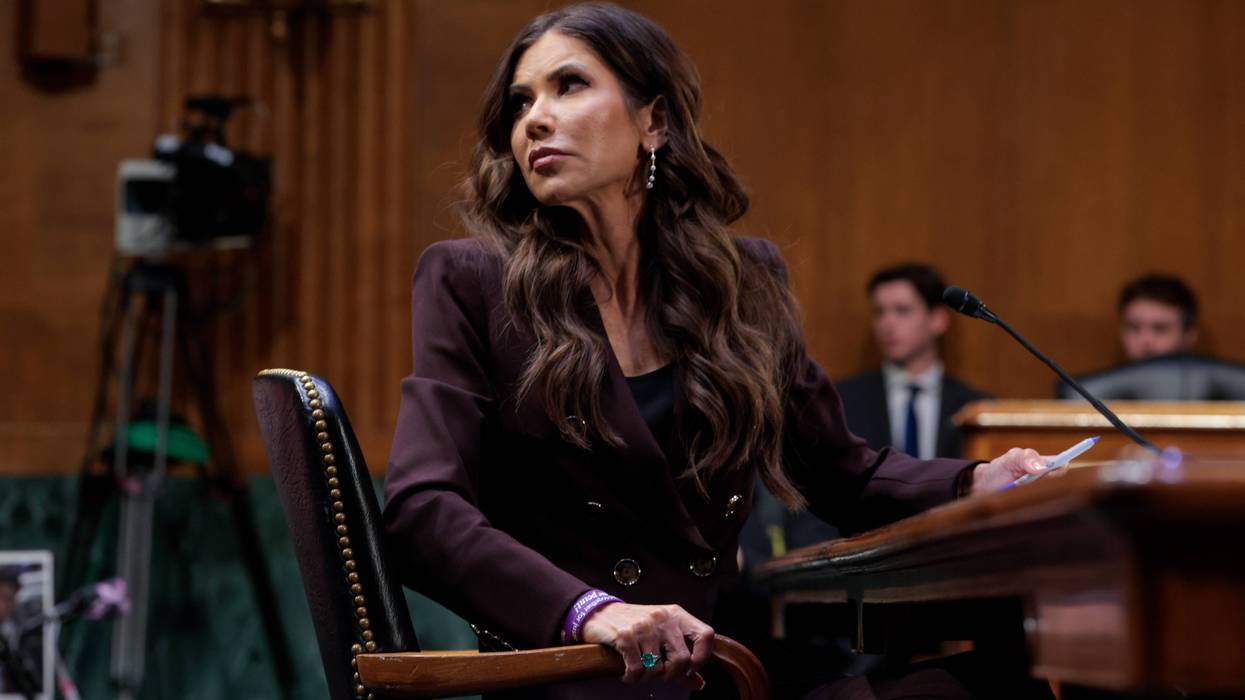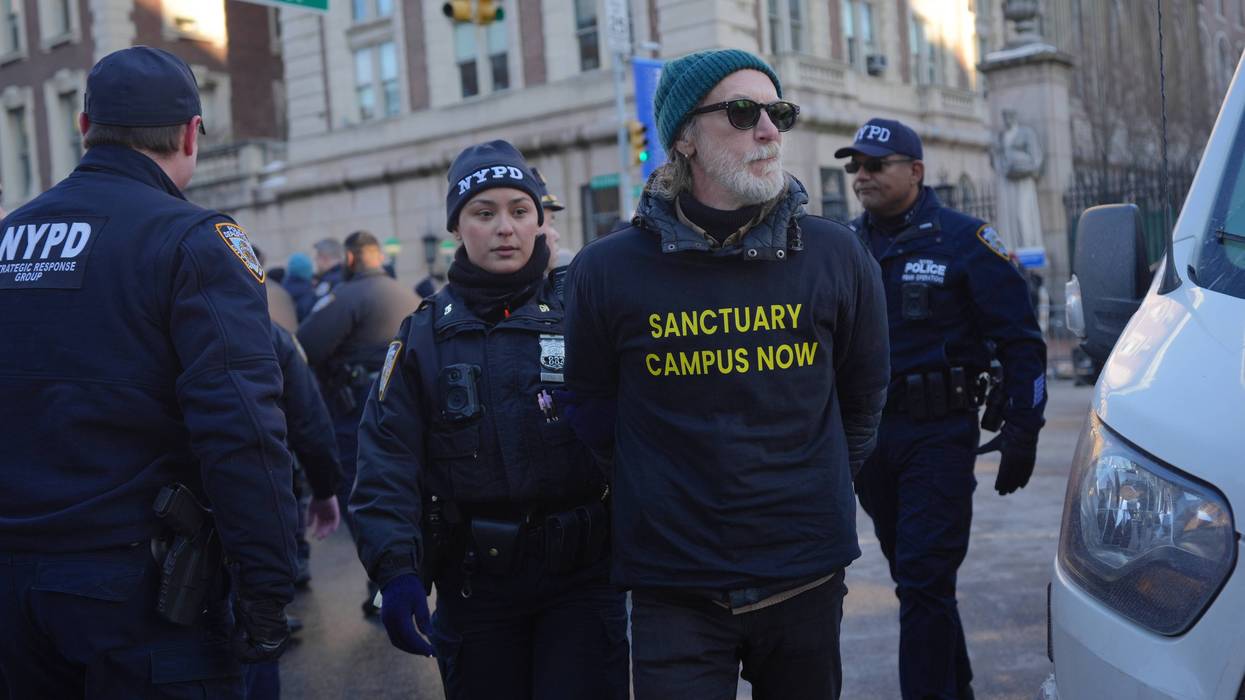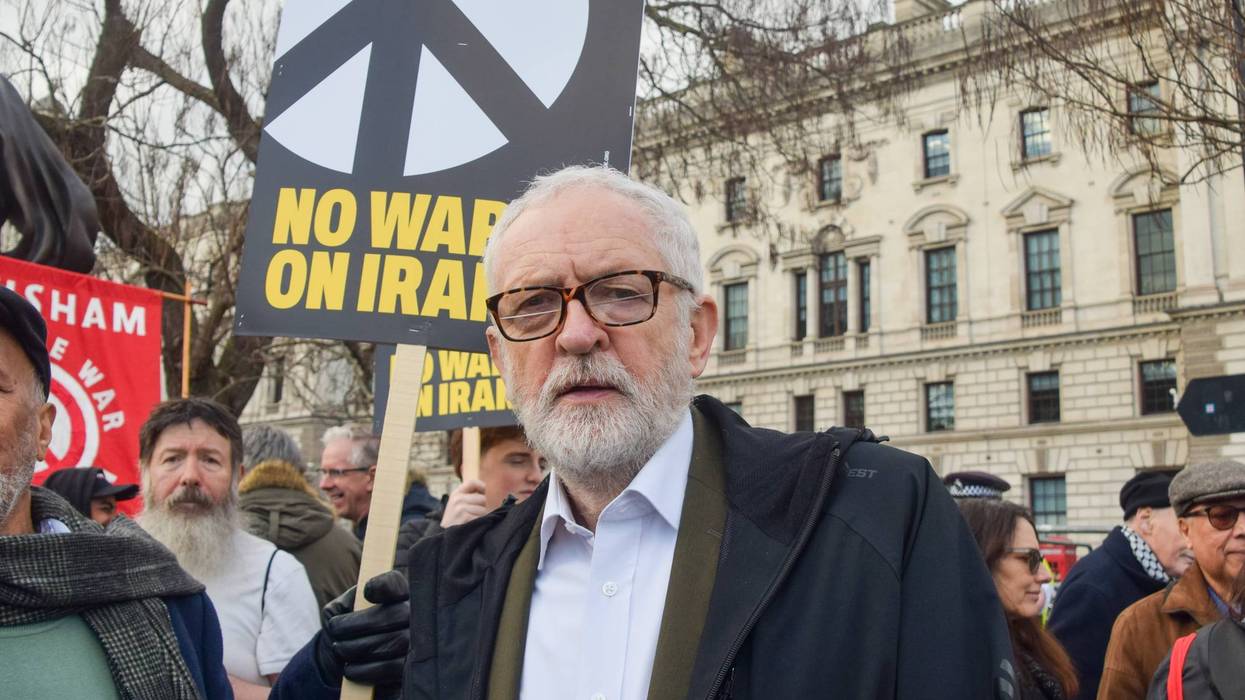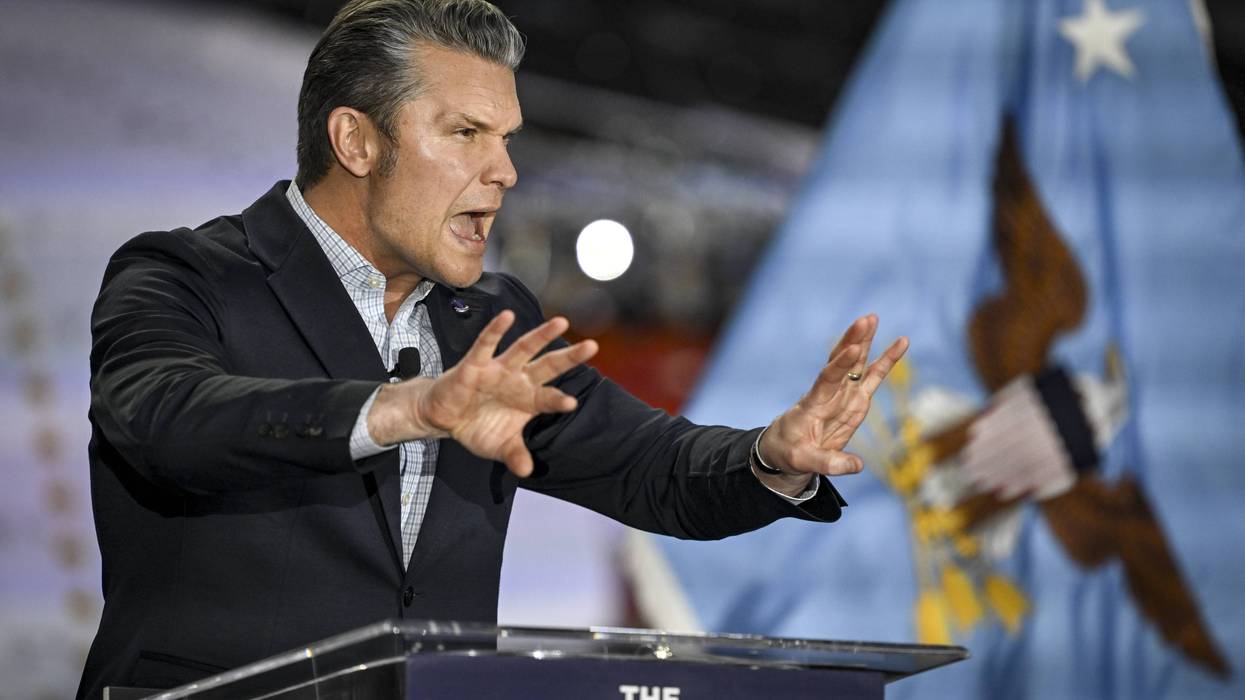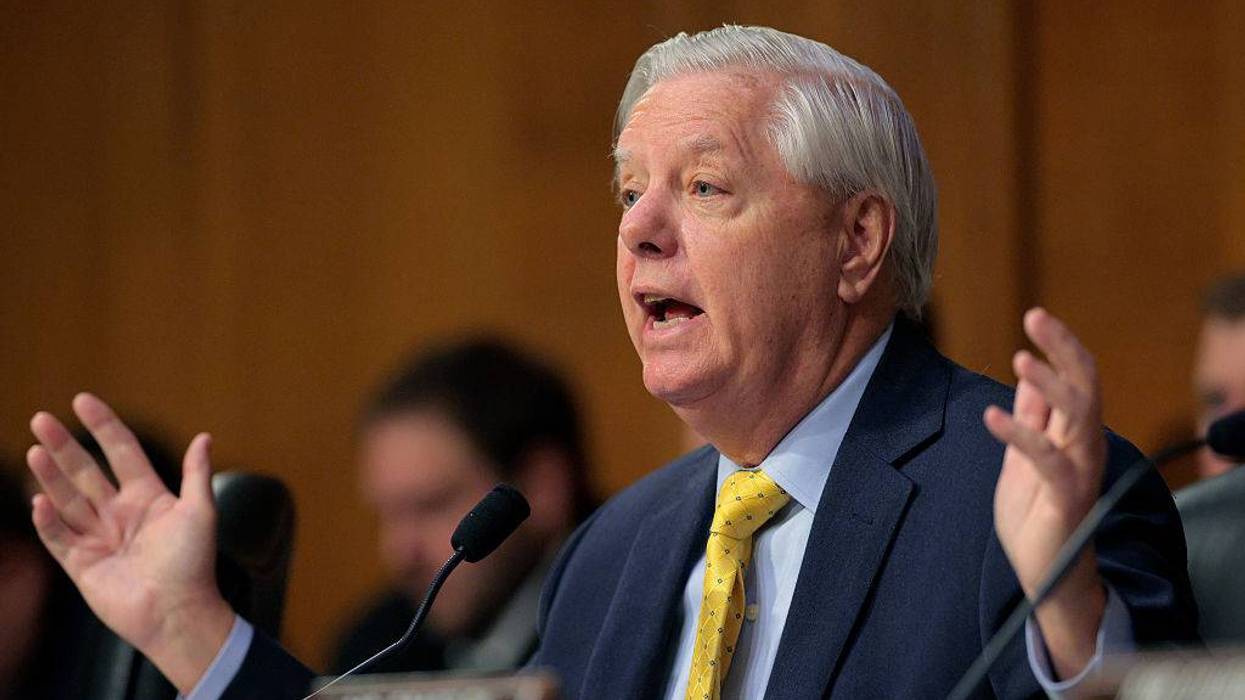LIVE COVERAGE
Ribbital: Democracy As Something We Do, Not Just Have
Most memorable about this week's longest, basest, game-show SOTU, a toxic, lying, us-and-them hate fest: The rowdy multitude of responses from a populace "defying the lie that we are powerless." Bigly upstaging a goalie's Medal of Freedom was "a marathon of truth-telling," from a cogent Dem response to the Portland Frogs leading a restive, joyful, shaggy defense of "this thing we call democracy" by We the People, insisting, "Don't be afraid to call it fascism - we got to meet this fuckin' moment."
The State of the Union speech, already a stale ritual of forced national unity, felt more farcical than ever in these rancorous times, a tawdry, surreal piece of performance art whose only true believers may be those MAGA morons who, when challenged, frantically, mindlessly yell "USA!! USA!!," their version of, "Oh yeah?!" They resorted to it several times Tuesday at a tacky event that over 70 deeply fed up Democrats skipped. "The President has shown no respect for the principles upon which this country is based," argued Maine's Sen. Angus King. "I cannot in good conscience participate in (a) function that would require me to ignore all that has gone before, and to pay him a measure of respect he has not earned." Other apt SOTU responses: Turner Classic Movies showed Gaslight, and Jeff Tiedrich proclaimed, "The State of the Union is - oh, who gives a fuck, really?"
The "18-year-long," "excruciatingly tedious," "most openly racist State of the Union in modern history" came as its perpetrator faces record-low 36% approval ratings, trailing by double digits in swing states and bleeding support among independents as he babbles about "fake polls," "silent support" and "made-up numbers" by "professional cheaters." His deplorable flunkies aren't faring any better. In a civil trial where investors are suing Elon Musk, his lawyers can't find jurors because so many Americans "hate him." They also hate ICE Barbie and her stormtroopers, and Kash Patel for his $75K, not-at-all-personal trip to Milan to chug beer with hockey players that so infuriated his own work force they sent 8 videos of it to media. There's also Rep. Tony Gonzales with another sex scandal MAGA doesn't need (though they need his seat), and perennial losers Kegseth and Pirro.
Still, given he "continues to live in a fantasyland where stuff becomes true just because he says it is," his SOTU was awesome, like his glittering State of Denial. Likely invisible were the Suffragette white outfits of Dem women, the photos of Renee Good and Alex Pretti, Rep. Al Green's sign, "Black People Aren't Apes" (he was escorted from the chamber), the "Release the Epstein Files" pins, and the stalwart, near-dozen Epstein survivors themselves invited by Dem lawmakers, reminders of ghastly new evidence and allegations and cover-ups lurking behind one key question from survivor Jess Michaels: “Does our government belong to the American people, or to those who prey on them?” There was, of course, no answer. In fact, there was no mention of Epstein. Or of the reviled ICE, stalled DHS, on-the-brink Iran, or long-suffering Ukraine on the 4th anniversary of its invasion.
There was, instead, a hate-lie-and-grievance-filled shit show, a Klan rally of "white-supremacist wolf whistles," a "fascist rally peppered with flop-sweat one-liners," a slurred, venomous, fact-free barrage of boasts, insults, puffery met with faithful Kim Jong Un-esque applause from co-conspirators filling up empty seats for an old man who endlessly burbled, lurched and clung to a podium as he hid a gross bruised hand behind him. It was, wrote Ana Marie Cox, a speech "simultaneously banal and unsettling (by) a greasy fleshhole of hate...rancid and powerful." Her trenchant analysis: "I fucking hate this guy." And no, full disclosure, we did not watch it. We just...couldn't. But sincere thanks to those strong souls who chronicled the debacle, most notably Mehdi Hassan and the folks of Zeteo here and here. Also to Jimmy Kimmel, for his fine, no-diapers introduction.
The musty lies and bombast unspooled. We were a dead country but now we're "the hottest." Dems are "suddenly using the word 'affordability' - somebody gave it to them," but high prices are all their fault. Countries hit by tariffs are "happy." Most foul were lurid tales about the "scourge of illegal immigration," like "Somali pirates who have ransacked Minnesota" and "pillaged $19 billion from the American taxpayer," though it was 80 Somali-Americans, led by a white American woman, who committed some fraud while over 100,000, 95% of them U.S. citizens, pay nearly $70 million in taxes and contribute $8 billion to the community but sure let's go with a collective ethnic smear. The crude, dumb, divisive finale: Stand if you agree your first duty is "to protect American citizens, not illegal aliens" - and don't forget the Seig Heil. Cheap Theatrics 'R Us.
Dems sat. Trump raged, "You should be ashamed." Ilhan Omar fought back: "You should be ashamed. You're killing Americans." MAGA yelled "USA!" Goebbels Miller shrieked “0 democrats stood for the (principle) leaders must serve citizens before invaders. Never has there been a more stunning moment in Congress." True, but not how he thinks. In a final, Oprah moment, the "merit vampire" who thrives on stolen glory bragged, "We’re winning so much we don’t know what to do about it" and to prove it here's the carefully choreographed USA Olympic hockey team who jeered with him in the locker room about their women cohorts who won bigger: "Come on in!" The MAGA frat party dregs cheered, hooted, fist-pumped more "USA!" Then he gave out medals, and fed the athletes Big Macs. Press Barbie: "He knows how to celebrate champions. No one does it like him!"
Ugh. The flip side: Kudos to the five hockey players, and the moms who likely largely raised them, who declined the non- invite; four of five came from Minnesota. And kudos to Public Enemy Hall of Fame rapper Flavor Flav, a longtime supporter of women's sports, who invited the women's team to party in Las Vegas and "celebrate for real for real" in July on a She Got Game weekend funded by him and area resorts. And gracious thanks to actor, gourmand and all-round mensch Stanley Tucci, who hosted the women on the patio of his favorite Milan restaurant, the Michelin-starred Ristorante Ratanà, where they happily feasted on pumpkin risotto and just desserts. Meanwhile, in the wake of the mad king's claptrap, Democrats won three local elections in swing states: two in Pennsylvania for a majority in the state house, one in Maine, further cementing Democrats’ hold.
Finally, there were myriad, heartening alternative events where lawmakers, advocates, Epstein survivors and whistleblowers vowed to, "Lean in, stand up and show up" in defense of democracy and fierce resistance - and stark contrast - to the small, mean narcissist down the road making up "facts" and boasting about stripping 2.4 million people of food stamps. The official Democratic response, from Virginia Gov. Abigail Spanberger, was succinct and forceful. Citing the pernicious rhetoric, cruelty, cover-ups, scams, ballrooms, she asked who benefits: "Is the president working for you? We all know the answer is no." Sen. Alex Padilla pointedly gave a follow-up in Spanish. Famously last seen getting tackled by DHS thugs for daring to ask ICE Barbie about her brownshirts' violent abuses, he asserted, "I am still here. Still standing. Still fighting."
His sense of resolve was echoed at a "People’s State of the Union” rally on the National Mall held by MoveOn and Meidas Touch, where speakers lambasted Trump's imaginary "Golden Age of America" in a country that in fact offers "one reality for everyday people and another for the rich and well-protected." Citing vast unmet needs on healthcare, housing, jobs, Pennsylvania Rep. Summer Lee of the Working Families Party vowed to "elevate the voices of (those) angry, scared and fed up with an administration that’s done nothing to help and a lot to hurt everyday people." Sen. Chris Murphy decried a speech ignoring ICE "tear-gassing schools, murdering citizens, and disappearing legal immigrants." The Progressive Caucus' Greg Casar reviled a $4-billion grifter "lecturing you, the American people, about how good you have it (when) everyone but Trump’s rich friends knows it’s a disaster,."
Meanwhile, at the National Press Club a few blocks away, a dozen members of the illustrious Portland Frog Brigade headlined a giddy, heartfelt, sold-out State of the Swamp, a SOTU "ribbital" hosted by DEFIANCE.org and advocacy media network Courier where attendees were encouraged to gather, preferably in frog caps, in "peaceful defiance and civic participation." M.C.'ed by Defiance head and former Trump staffer Miles Taylor, the event drew dozens of speakers, and a few frogs, who over several hours gave resolute, kinetic, briskly-3-minute speeches focused on the vital need to remember that, "Democracy is something we do, not just something we have." The most substantial time went to the last three speakers - the combative mayors of Minneapolis and Chicago, and an enraged Robert DeNiro - and they were all electrifying.
The mood was chill, festive, occasionally profane, but the message was consistent: In the face of unprecedented threats to our democracy by "a rapist vulgarian named Donald Trump," we must, "Refuse to shut up, sit down, or even stop ribbiting. Stay LOUD." Between speakers, video clips showed historic figures of defiance: MLK Jr, Muhammad Ali, Black Panthers, James Baldwin, John Lewis, lunch-counter sit-ins, Jesse Jackson rousing Sesame Street kids to say, "I am somebody." Next to the stage, about 20 inflatable frogs, "the jesters of this movement," stood and often danced in a "frog pond" with signs: "Damn Straight," "Amphifa," "Frogs Not Fascists." Earlier, they'd hit the Capitol to hand out pocket Constitutions to members of Congress and toured D.C. for proud green selfies. Taylor: "Who better to help navigate the swamp than a creature born in the swamp?"
Despite the focus on matters of substance - housing, healthcare, climate crisis, ICE abuses, democracy itself - the tone of many speakers was light-hearted and self-deprecating. Delaware Gov. Matt Meyers: "There are more frogs in this room than people in my state." New York Rep. Dan Goldman: "It's great to be here and not in Congress tonight." Oregon Sen. Ron Wyden on his political low profile: "I'm barely a household name in my own household." Oregon Rep. Maxine Dexter: "Thank you to the frogs who hopped across the country." The array of speakers was admirably broad - from a panel of First Amendment legal defenders to former White House Press Secretary Stephanie Grisham - and outspoken on "the weak, dumb, small, sad man" and "pathetic whiny loser who knocked down the East Wing and thinks he can knock down our democracy."
Colorado Rep. Jason Crow, one of the six veterans along with Mark Kelly under attack by Kegseth for re-iterating that the military should follow the law, began with, "Well, President Trump keeps trying to put me in prison. But I've never been very good at sitting in my foxhole and letting them send grenades my way. I fight back." Motormouth Joe Walsh, former "rock-ribbed" conservative and Illinois GOP rep with serious buyer's remorse, and author of the 2020 book Fuck Silence: Calling Trump Out for the Cultish, Moronic, Authoritarian Con Man He Is, was resolute on the "cruel bastard" who gave us Jan. 6 and "don't you for one moment think he's not gonna try" to mess with coming elections: "This moment calls for all of us to be courageous - we ain't never been here before. Our job is to blow him outta the water. Fuck Trump. The mid-terms are happening."
Over hours, their messages aligned: Fascists come after everyone in the end, even fellow fascists. MAGA is waiting its turn in the trashbin of history. Help put it there. Courage is more contagious than cowardice. An old story is dying. The elites have never been the ones to save us - it's always the people. Cruelty isn't strength, nor is defying the rule of law. Strength is the moral courage to say this is not right, to see other people as fully human. When empathy disappears, authoritarianism is next. Gutsy Minneapolis Mayor Jacob Frey: "We are not spectators in this moment. We are stewards of our democracy. Hold strong." DeNiro, on feeling "betrayed" by today's America, "like an abused spouse professing love for their abuser." "You have to lift people up," he said, his voice cracking. "If you've ever loved your country, this is the time to show it."
The aftermath of a grotesque SOTU tells us everything we need to know about the historic moment. Trump raged about "the bulging, bloodshot eyes of crazy people" who declined to stand with his fascism: "We should send them back (on) a boat with Robert DeNiro, another sick and demented person....saying (things) seriously CRIMINAL!" News surfaced that, during the speech, Ilhan Omar guest Aliya Rahman, a disabled Minneapolis woman dragged from her car by ICE who later gave searing testimony to Congress, was forcibly removed by Capitol Police and charged with "Unlawful Conduct" after she silently stood up in the gallery, like many others. On Friday, Trump held a million-dollar-a-plate, "Billionaires first, Americans last" fundraiser. And the day before, NYC Mayor Mamdani, with the help of AOC, released an adorbs video about his new free child care program. Which side are you on? Tough call.
Big Tech's 'AI Climate Hoax': Study Shows 74% of Industry's Claims Unproven
A report released on Tuesday says that the tech industry is blowing hot air with its claims that generative artificial intelligence will be beneficial for the climate.
The report, titled "The AI Climate Hoax," was commissioned by a broad consortium of environmental advocacy organizations and authored by climate and energy analyst Ketan Joshi.
In total, it analyzes more than 150 statements made by both big tech companies and organizations such as the International Energy Agency about the supposed benefits of generative AI.
The report finds that 74% of such claims made by these institutions are unproven, with 36% not bothering to cite any evidence whatsoever.
One key finding in the report is that many claims about the purported benefits of the technology conflate traditional AI systems with more recent generative AI systems, which require massive amounts of energy and are spurring demand for the construction of power-and-water-devouring data centers across the US.
"Even if these benefits are real," the report writes of traditional AI systems, "they are unrelated to—and dwarfed by—the massive expansion of energy use from the generative AI industry," which is projected to to consume 13 times as much energy as traditional AI by the year 2030.
Even the more supportable claims about the benefits of traditional AI deserve serious scrutiny, the report notes, since "they tend to rely on weaker forms of evidence, such as corporate websites, rather than published academic research," which was only cited in 26% of claims made about AI benefits.
The report also knocks big tech companies for using assorted strategies to conceal the true extent of their energy use, including buying renewable energy certificates even while relying on fossil fuels to power their operations, and vowing to implement highly implausible solutions to mitigate the climate impact of data centers, including carbon capture technologies and even building orbital data centers in space.
Commenting on the report, study author Joshi said its findings seem to show "tech companies are using vagueness about what happens within energy-hogging data centers to greenwash a planet-wrecking expansion."
"The promises of planet-saving tech remain hollow, while AI data centers breathe life into coal and gas every day," Joshi added. "These claims of climate benefit are unjustified and overhyped, and could cover up irreversible damage being done to communities and society."
Jill McArdle, international corporate campaigner at study sponsor Beyond Fossil Fuels, said the study shows "there is simply no evidence that AI will help the climate more than it will harm it," and accused Big Tech companies of "writing themselves a blank cheque to pollute on the empty promise of future salvation."
AI data centers have become a major controversy throughout the US in recent months, as their massive energy needs have pushed up utility bills and put a strain on communities’ water supplies.
A study published in the journal Nature Sustainability last year found that data centers could soon consume as much water as 10 million Americans and emit as much carbon dioxide as 10 million cars, or roughly the same amount of consumption as the entire state of New York.
Trump's AI Data Center 'Ratepayer Protection Pledge' Derided as Unenforceable, 'Theatrical Stunt'
Climate action advocates and energy experts alike said Wednesday that President Donald Trump's "ratepayer protection pledge," introduced during his State of the Union address Tuesday night, will do little to alleviate rising household electricity costs brought on by the White House's mandated artificial intelligence expansion and the construction of thousands of hulking data centers across the country.
During his address, the president acknowledged that many Americans are "concerned that energy demands from AI data centers could unfairly drive up their electric utility bills," as they already are.
A CNBC analysis published last November found that in addition to average electricity prices rising by more than 6% across the country, according to the Energy Information Administration, households in states with high concentrations of data centers—including Virginia, Illinois, and Ohio—have seen their rates climb by as much as 16% in the past year.
The National Energy Assistance Directors Association also said last year that about 21 million American families were behind on their utility bills, with the average overdue amount about a third higher than it was in 2023.
Trump said Tuesday that he had negotiated a deal with major tech companies, ensuring they "have the obligation to provide for their own power needs and can build their own power plant as part of their factory, so that no one's prices will go up."
Energy industry experts told Politico on Wednesday that if enforced, the pledge—which Trump and the White House offered few details about—would still only partially address rising household costs associated with the AI expansion, which are being caused by the AI industry's rapidly growing demand for power lines, fuel, natural wind turbines, and other energy needs to run massive data centers.
The data centers require energy equivalent to that of 186 large nuclear power plants, according to the data firm Cleanview, and some of them have electricity needs that could power millions of homes.
But Ari Peskoe, director of the Electricity Law Initiative at the Harvard Law School Environmental and Energy Law Program, told Politico that in seeking lower costs for consumers, the White House is "putting this pledge on the wrong entities," as the details of how energy costs are distributed among millions of ratepayers are determined by utilities and state regulators—not tech giants like Microsoft, Google, and Anthropic, which lauded the president's announcement and announced their own pledges to ostensibly protect households from rising costs.
“Most of today’s cost pressure is coming from transmission, distribution, and system readiness, not energy supply,” Brandon Owens, a grid expert and founder of advisory platform AIxEnergy, told Politico ahead of the speech. “Those costs remain even if a data center self-supplies generation.”
With Trump fast-tracking AI data center expansion, utilities are spending far more than they have previously to set up electricity infrastructure. As Politico reported, PJM, which operates the grid for 13 states in the eastern US, has approved $11.8 billion for new transmission projects, with data centers being the largest recipients of new electricity. About 67 million people in the region covered by PJM will split the cost of the new projects, paying roughly double what they did for the company's last two transmission budgets.
Emily Peterson-Casson, policy director for the progressive advocacy group Demand Progress, said in a statement ahead of the State of the Union address that Trump's ratepayer protection pledge amounts "to worthless pinky swears from the multi-billion dollar corporations who are trying to force us to sacrifice our jobs, our children, our privacy, and our communities for an uncertain, AI-powered future that they can control and we won’t."
Rising electricity costs, she said, are just one of many concerns Americans have expressed about AI in numerous recent polls. One taken by YouGov last week found that nearly two-thirds of Americans believe the expansion of AI will reduce the number of jobs available to workers, and another by Bentley University and Gallup found 79% of respondents didn't trust companies to use AI responsibly.
"In addition to providing a dubious balm to skyrocketing electricity bills, these pledges do nothing to address out-of-control AI that caused outages at Amazon Web Services, creates sexualized images of minors, and has led teens in need of help to take their own lives," said Peterson-Casson. "These pledges are nothing more than desperate damage control for companies who only now realize that voters see them as the villains of this story.”
The climate action group 350.org also derided the ratepayer protection pledge as a "theatrical stunt with no enforceable mechanism," and said it would only worsen the ramp up of costly fossil fuel production that Trump has overseen by delaying the closure of expensive, polluting coal plants; blocking solar and wind projects; and approving more liquefied natural gas exports.
Trump said the his address that the US is experiencing a "Golden Age," noted 350.org executive director Anne Jellema, but that's true "only for fossil fuel companies that poured $96 million into the Trump administration."
"For the millions of Americans who cannot afford to pay their energy bills, it is like heading back to the dark ages. The Trump administration cannot claim to stand for American consumers while blocking progress in renewables, the cheapest form of energy available today. It cannot champion affordability while doubling down on a highly volatile gas market and driving conflicts that inevitably increase energy prices everywhere,” said Jellema. “Trump’s bravado cannot disguise the fundamental insecurity at the heart of his administration: Fossil fuels are increasingly unviable, and even businesses want to move on. Around the world, people are demanding and building a clean, affordable energy future, with or without the US government."
350.org also pointed to a recent poll by E3G, Beyond Fossil Fuels, and We Mean Business that showed 97% of nearly 1,500 business executives supported a transition away from fossil fuels to renewable energy sources, citing "competitive edge and long-term energy security."
Journalist Ray Locker added on social media, "The best way to protect ratepayers is to not shackle them to using fossil fuels to generate electricity."
Green Party Scores Upset Win in UK Election in Blow to Labour, Far-Right Reform
Green Party candidate Hannah Spencer on Thursday won an upset victory in a byelection in the Gorton and Denton constituency, delivering a blow to both Labour Prime Minister Keir Starmer and the far-right Reform Party led by Nigel Farage.
As reported by the Guardian, Spencer, a local plumber, won by overturning a 13,000-vote majority that the Labour Party achieved in the 2024 general election.
In fact, Labour fell to third place in the Thursday election, winning 9,364 votes, compared to 14,980 votes for the Greens and 10,578 votes for Reform.
In her victory speech, Spencer emphasized major class divides in the UK, where she said people are working increasingly harder for fewer benefits.
"Working hard used to get you something," she said. "It got you a house. A nice life. Holidays. It got you somewhere. But now—working hard? What does that get you?... Instead of working for a nice life, we’re working to line the pockets of billionaires. We’re being bled dry."
The Green Party said Spencer's victory showed it was now a viable force in national elections, projecting that it is "on track to win over a hundred seats at the next general election, if the historic swing achieved to win Gorton and Denton is replicated nationwide."
Green Party leader Zack Polanski hailed the election result and predicted "a tidal wave of new Green MPs" in future elections should current trends continue.
"When I was elected Leader of the Greens I said we were here to replace Labour and I meant it," Polanski said. "Hannah was a fantastic candidate and I know she’ll make a brilliant MP."
Starmer, who has pushed the Labour Party to the right on issues such as immigration and transgender rights during his tenure, reacted bitterly to the defeat in a letter he sent to other Labour MPs.
"The result in Gorton and Denton is deeply disappointing," Starmer wrote. "Instead of a Labour MP who can be a local champion delivering for Gorton and Denton alongside a Labour Government and a Labour mayor, the people of Gorton and Denton now have a representative who is more interested in dividing people than uniting them."
Starmer, whose job approval rating in polls is consistently under 20%, also predicted that "over the coming months, people will feel the benefit of the long-term decisions this government is taking."
Socialist commentator Owen Jones, a longtime Starmer critic, gloated over the result in a social media post in which he reminded followers of Starmer's past statement that left-wing voters could "leave" if they didn't like the changes he was making to Labour.
"OK, Keir Starmer, we did as you asked us!" he wrote. "Happy now?"
Detained Columbia Student Released by ICE After Mamdani-Trump Talk
Update (4:25 pm ET):
Columbia University student Ellie Aghayeva was released from Immigration and Customs Enforcement custody Thursday afternoon after New York Mayor Zohran Mamdani expressed concerns about her detention in a meeting with President Donald Trump earlier in the day.
Mamdani shared the news on social media at 3:13 pm Eastern time.
“Just got off the phone with President Trump,” he wrote. “In our meeting earlier, I shared my concerns about Columbia student Elaina Aghayeva, who was detained by ICE this morning. He has just informed me that she will be released imminently.”
Aghayaeva then confirmed her release on her Instagram account, according to journalist Prem Thakker.
“I just got out a little while ago. I am safe and OK,” she wrote from an Uber on her way home.
“I am in complete shock over what happened and my phone is blowing up with calls from reporters,” she continued. “I need a little bit of time to process everything.”
Earlier:
This is a developing story... Please check back for possible updates...
Federal agents with the Department of Homeland Security abducted an international student with a visa from her apartment in a Columbia University-owned building in New York on Thursday, after lying to gain access to her home.
Acting university president Claire Shipman released a statement saying that around 6:30 am Eastern, the federal agents had "made misrepresentations to gain entry to the building to search for a 'missing person.'"
They then detained Ellie Aghayeva, a senior studying neuroscience and political science, according to a statement from her friends that was given to the American Association of University Professors.
Manhattan Borough President Brad Hoylman-Sigal, a Democrat, said in a statement that agents with Immigration and Customs Enforcement (ICE) had "used a phony missing persons bulletin for a 5-year-old girl."
"It is unconfirmed at this time whether they impersonated an officer to do so," Hoylman-Sigal told Prem Thakker of Zeteo News.
State Assemblymember Micah Lasher (D-69) told the New York Times that the ICE agents had presented themselves as police officers. A building superintendent let them in upon learning about the supposed missing child and led them to Aghayeva's apartment.
According to the ACLU: "ICE agents should not be falsely impersonating another government official or claiming they have a different governmental purpose to gain your permission to come into your home. A person’s 'consent' under these circumstances is not valid. ICE’s resulting entry in the home and any arrests they conduct violate the Fourth Amendment of the US Constitution."
After being arrested, Aghayeva managed to post a one-second Instagram video to her 105,000 followers with the message, "DHS illegally arrested me. Please help."
Protests erupted on Columbia's campus as news of Aghayeva's abduction spread.
Protest outside Columbia going on right now after ICE abducted a student on campus early this morning.@JumaaneWilliams and @bradhoylman are here. pic.twitter.com/0fARmHEBvJ
— Timmy Facciola (@TimmyFacciola_) February 26, 2026
Court records showed that a lawyer for Aghayeva had filed an emergency petition requesting her release.
Shipman noted in her statement that all law enforcement officers "must have a judicial warrant or judicial subpoena to access nonpublic areas of the university, including housing, classrooms, and areas requiring [Columbia University ID] swipe access. An administrative warrant is not sufficient."
Last month, a leaked internal ICE memo revealed that acting Director Todd Lyons had given agents broader authority to carry out warrantless arrests. Last May, Lyons issued guidance saying agents needed only an administrative warrant, not a judicial one, to enter a home.
A coalition of advocacy groups sued the Trump administration this week over warrantless immigration arrests in North Carolina.
New York Gov. Kathy Hochul, a Democrat, said Thursdauy that ICE agents clearly "didn't have the proper warrant, so they lied to gain access to a student’s private residence."
US Rep. Adriano Espaillat (D-NY) said the latest "exhibit of the Trump administration’s lawless actions—which are rarely supported by legitimate warrants or subpoenas—is yet another reminder that Columbia University and other institutions must enhance the protections and policies they utilize to create a safe environment for those they serve and employ."
"Students and faculty should not fear for their safety in their dorm rooms, the classroom, or anywhere else on campus," said Espaillat.
Columbia students including Mahmoud Khalil and Mohsen Mahdawi were been detained last year by immigration agents under the Trump administration; Mahdawi had asked Columbia officials to move him to a safe location prior to his arrest, but his lawyer told The Intercept that university had told him it was unable to move him to housing where he would be protected.
As Common Dreams reported earlier this month, federal immigration agents have increasingly used deceptive tactics to carry out arrests and raids in places like Minneapolis, where thousands of agents were surged in recent months
"Yet again, ICE is using blatantly illegal trickery to circumvent judicial warrant requirements and abduct a student," said former New York City Comptroller Brad Lander, now a candidate for the US House in the state's 10th District. "These are the tactics of brownshirts. That’s why I’ve long been calling to abolish ICE. And why Congress should not grant them one more penny."
"This lawlessness has to end. Ellie Aghayeva must be safely released. And Dylan Contreras," said Lander, referring to a Bronx high school student who was detained last year. "And too many other students whose names we don’t even know."
US Commanders Want to Make War With Iran as ‘Bloody’ as Possible to Bring About Biblical End Times, Officers Report
In less than a week, the US and Israel's war has rendered unfathomable suffering upon the people of Iran. Over 180 schoolgirls and staffers were killed in a massacre this weekend, and several hospitals have reportedly been struck, amid numerous other attacks on civilians.
But some US troops are being told the bloodletting is all a part of God's plan.
At a briefing on Monday, as President Donald Trump unleashed what has been called a "carpet bombing" of Tehran, a combat-unit commander reportedly told noncommissioned officers (NCOs) that the commander-in-chief was “anointed by Jesus to light the signal fire in Iran to cause Armageddon and mark his return to Earth."
The complaint, sent by one of those noncommissioned officers, was just one of at least 110 similar reports received by the Military Religious Freedom Foundation (MRFF) since Trump first launched strikes on Saturday.
In compliance with the First Amendment, the Department of Defense has long adopted rules against proselytizing within the armed forces. But under Defense Secretary Pete Hegseth, an evangelical Christian who has said the West must wage a "crusade" against Islam, Christian nationalist invocations in the military have become commonplace.
Mikey Weinstein, the president and founder of MRFF and an Air Force veteran who served in the White House of former President Ronald Reagan, told independent journalist Jonathan Larsen that the group has been “inundated” with complaints from NCOs since Saturday, which all have “one damn thing in freaking common.”
"Our MRFF clients report the unrestricted euphoria of their commanders and command chains as to how this new 'biblically-sanctioned' war is clearly the undeniable sign of the expeditious approach of the fundamentalist Christian 'End Times' as vividly described in the New Testament Book of Revelation," Weinstein said.
"Many of their commanders," he added, "are especially delighted with how graphic this battle will be, zeroing in on how bloody all of this must become in order to fulfill and be in 100% accordance with fundamentalist Christian end-of-the-world eschatology."
According to Larsen, who first reported on the MRFF's findings on Monday, the message has been spread far and wide as US troops rained missiles down upon Iran.
Larsen reported that the "complaints came from more than 40 different units spread across at least 30 military installations," and have involved commanders in every branch of the US military.
One noncommissioned officer, who did not identify himself out of fear of retaliation, said his commander “urged us to tell our troops that this was ‘all part of God’s divine plan’ and he specifically referenced numerous citations out of the Book of Revelation referring to Armageddon and the imminent return of Jesus Christ.”
The NCO added that his commander "had a big grin on his face when he said all of this, which made his message seem even more crazy."
"Our commander would probably be described as a 'Christian First' supporter," he said. "He has been this way for a very long time and makes it clear that he desires all of us under him to become just like him as a Christian. But what he did this morning was so toxic and over the line that it shocked many of us in attendance at the ops readiness briefing."
The NCO identified himself as a Christian, but emailed MRFF on behalf of 15 of his troops, which included at least one Muslim and one Jewish person.
He said that their commanders' remarks “destroy morale and unit cohesion and are in violation of the oaths we swore to support the Constitution.”
Christian nationalism has long simmered just under the surface of US military culture and has been invoked by presidents of the past, including George W. Bush, who referred to his War on Terror as a "crusade."
But Hegseth, who regularly hosts Christian prayer services at the Pentagon during work hours, rails against "secular humanism" and the "godless left," and has hosted the notorious fundamentalist pastor Doug Wilson—who opposes the right of women to vote and calls for the US to be a Christian theocracy—at the Pentagon, has dropped any pretenses of religious pluralism.
"While America’s relationship with Iran is influenced by all the typical geopolitical factors of oil, culture, and nuclear weaponry, there is a part of American foreign policy that is influenced by apocalyptic evangelical theology," wrote Josh Olds, a pastor and theologian, on Monday for Baptist News Global.
Christian fundamentalists, some of whom have the ear of the White House, he said, view an Iranian war with Israel as central to triggering Armageddon, during which God will miraculously strike down Israel's enemies, Jesus will return to Earth, and Christians will be raptured to Heaven, according to Biblical teachings.
He said that while Iran's Muslim leaders are often accused of being dangerously irrational out of blind religious fundamentalism, "it is increasingly clear that American actions are shaped by it as well."
In just over three days, US and Israeli strikes have killed at least 787 people in Iran, according to a Tuesday report from the Iranian Red Crescent Society, including hundreds of civilians. In addition to schools and hospitals, attacks have been reported against crowded residential buildings, a radio and TV broadcast center, and a sports complex.
"Donald Trump partnered with Israel to bomb Iran because of the influence of an eschatology that sees conflict with Iran as setting the stage for fulfilled prophecy," Olds said. "The irony is profound: A faith centered on loving enemies and making peace becomes a framework that welcomes and advocates violence. The result is not the advance of God’s kingdom but its irrevocable damage in the eyes of the world."
Corbyn Accuses Starmer Government of ‘Echoing Tony Blair’s Obedience to Washington’
"Blair dragged the UK into an illegal war that triggered a spiral of hatred, conflict, and misery," Corbyn said. "Twenty-three years later, another Labour prime minister is doing his best to follow in Blair’s footsteps."
As UK Prime Minister Keir Starmer allows British bases to be used as part of the US-Israeli war against Iran, the former leader of his Labour Party says he's making the same mistake that another Labour PM made 23 years ago.
Jeremy Corbyn, the socialist member of Parliament who led Labour from 2015 to 2020, said on Tuesday that Starmer was "echoing Tony Blair’s obedience to Washington", referring to the then-prime minister's decision in 2003 to join US President George W. Bush's war in Iraq.
"Ignoring the wisdom of ordinary people who could see the catastrophe ahead, Blair dragged the UK into an illegal war that triggered a spiral of hatred, conflict, and misery. More than a million Iraqi men, women, and children paid the price." Corbyn wrote in a Tuesday piece for the democratic socialist publicationTribune.
Infamously pledging to Bush, "I will be with you, whatever," Blair helped to promote the false claims that Iraqi President Saddam Hussein possessed weapons of mass destruction. And despite a lack of support from the United Nations, he joined Bush's "coalition of the willing," committing 46,000 British troops to the war.
"This was the last time a Labour prime minister blindly backed the wishes of the US and its warmongering president," Corbyn said. "Twenty-three years later, another Labour prime minister is doing his best to follow in Blair’s footsteps and drag us into a catastrophic, illegal war."
Unlike Bush, US President Donald Trump has not yet put boots on the ground in Iran, instead waging a destructive campaign of aerial bombings and missile strikes that have taken out the nation's Supreme Leader, Ayatollah Ali Khamenei, and other senior Iranian officials.
As of Monday, the Human Rights Activists News Agency (HRANA), a US-based monitor of human rights in Iran, reported that at least 742 civilians had been killed since Saturday by US and Israeli attacks, with nearly 1,000 injured and more than 600 deaths still under review.
While Starmer has stressed that the UK "had no role" in launching the war, he has lent credence to the questionable case the US and Israel have made to justify it, including emphasizing that Iran "must never have nuclear weapons."
Iran has always contended its nuclear program was not for military purposes, and it had no desire to produce a nuclear weapon. Prior to Saturday’s strikes, reports indicated that Iranian negotiators had offered to give up the nation's entire stockpile of enriched uranium.
And though he has accused Iran of launching "indiscriminate strikes" across the Gulf, Starmer has been reticent to criticize similar actions by the US and Israel, which have had vastly larger death tolls, including the bombing of a girls' school that reportedly killed 165 people, most of them girls between ages 7 and 12, and attacks on several hospitals.
One day after the first strikes were conducted, and following mounting pressure from Trump, Starmer announced that he'd given the US approval for "specific, limited defensive" use of three Royal Air Force (RAF) bases—Fairford in England, Akrotiri in Cyprus, and Diego Garcia in the Indian Ocean—in order to destroy Iran's missiles "at source" after a drone hit Akrotiri, causing minimal damage.
However, Starmer continued to claim that the UK had learned the "mistakes of Iraq," and "will not join offensive action now."
Corbyn said that Starmer's insistence that bases would only be used "defensively" was merely "meaningless vocabulary that reveals Starmer’s contempt for the intelligence of the British people."
In Parliament on Monday, Starmer said that "the use of the bases is to allow the US to use its ability to take out the ability of Iran to launch the attacks in the first place."
US Secretary of State Marco Rubio on Monday used similar reasoning to justify launching the war, explaining that Iran was likely to retaliate against a planned Israeli attack and that it therefore posed an "imminent threat" to US personnel even though that threat was contingent on Israel attacking first.
Corbyn described the idea of a "preemptive strike" as a contradiction in terms. "Under this convoluted reasoning," he said, "almost any attack on anybody can be classified as a defensive measure. Starmer’s words are Newspeak—and cannot shield his government from complicity in the devastation ahead."
Like in the United States, the British public has expressed low support for American and Israeli actions against Iran. According to a YouGov poll published on Monday, 49% disapprove of US military action, compared to 28% who support it. Fewer than 1 in 5 Labour voters said they supported it.
Voters also said they oppose their government's involvement. Compared with just 32% of Brits who said they supported letting the US use British bases, 50% said they opposed it.
"For too long, Britain has blindly followed the US as it indulges in disastrous imperial fantasies," Corbyn said, noting the UK's continued support for Israel over two years of US-sponsored genocide in Gaza.
Corbyn is now an independent MP who co-founded a new political party after being thrown out of Labour in 2020 over dubious accusations of antisemitism, which he has alleged stem from his strong criticism of Israel.
"It’s time to forge a different path. Now is not the time to try to rescue a ‘special relationship’ characterised by impunity, genocide, and war," he said. "Now is the time to forge an independent foreign policy based on international law and peace."
Damning CNN Supercut Exposes GOP Doublespeak About Trump's Iran War
"To Republicans in Congress: This is a war," said MS NOW host Joe Scarborough.
CNN on Monday aired a montage of Republican lawmakers and Trump administration officials that exposed major inconsistencies in how they discuss the unprovoked US-Israel war against Iran.
The supercut began with President Donald Trump on Saturday morning acknowledging that "we may have casualties" in the conflict with Iran because that "often happens in war."
The video then showed Sen. Lindsey Graham (R-SC), who told NBC's "Meet the Press" on Sunday that "I don't know if this is technically a war."
CNN put together a montage of conflicting messages from Republicans and administration officials on whether or not we’re in a war. pic.twitter.com/jJjNc85Buw
— Acyn (@Acyn) March 3, 2026
It then cut to a clip of Defense Secretary Pete Hegseth on Monday giving a news conference in which he said, "We didn't start this war, but under President Trump, we are finishing it."
The video went next Sen. Markwayne Mullin (R-Okla.), who declaratively told CNN on Monday that "this isn't a war," before cutting back to Hegseth saying, "We set the terms of this war, from start to finish."
Next, Rep. Brian Mast (R-Fla.), was shown telling CNN Saturday that "I don't think I don't think anybody should classify this as war," before cutting back to Hegseth saying, "War is hell, and always will be."
Reacting to the montage, CNN host Abby Phillip said, "It does seem like we're in a war."
MS NOW host Joe Scarborough, a former GOP congressman from Florida, reposted the CNN video and urged elected Republicans to be honest with US voters.
"To Republicans in Congress: This is a war," he wrote. "Just ask the President."
Kristi Noem Repeatedly Refuses to Apologize to Alex Pretti's Parents at Senate Hearing
"Kristi Noem is brutally unqualified," said one journalist. "Never should have been in spitting distance as head of homeland security/ICE."
As the US Department of Homeland Security remains partially shut down, DHS chief Kristi Noem testified before the Senate Judiciary Committee on Tuesday and repeatedly refused to apologize to the family of Alex Pretti, who was recently killed by immigration agents in Minnesota.
"Two of my constituents, Renee Good and Alex Pretti, were killed," Sen. Amy Klobuchar (D-Minn.), who is running for governor, said while questioning Noem about Operation Metro Surge, for which the secretary and President Donald Trump sent thousands of immigration agents to the Twin Cities in January.
Border Patrol agent Jesus Ochoa and Customs and Border Protection officer Raymundo Gutierrez fatally shot Pretti, a Department of Veterans Affairs nurse, just weeks after Immigration and Customs Enforcement (ICE) officer Jonathan Ross similarly killed Good. Their deaths fueled the congressional funding fight that has led to the ongoing shutdown.
"They should be alive today," Klobuchar said of the two 37-year-old US citizens. "In fact, in one month, in the city of Minneapolis, when you look at the three fatalities that were results of shooting, two of three were committed by federal agents."
After highlighting the various rights that DHS agents trampled on in Minneapolis and Saint Paul, and questioning Noem about the current footprint—roughly 500 more agents than the number before the surge that the administration claims has ended—Klobuchar turned to the secretary's attempts to smear both Good and Pretti as domestic terrorists.
"When I spoke to Alex's parents, they told me that you calling him a domestic terrorist, this was directly from them, the day after he was killed, a nurse in our VA, Alex, one of the most hurtful things they could ever imagine was said by you about their son," said Klobuchar. "Do you have anything you want to say to Alex Pretti's parents?"
Noem responded, "We were relying, in the hours after that incident that was so horrific, on information we were getting from the ground, from our agents."
When Klobuchar jumped in, reiterating the question and extending it to Good's relatives, Noem claimed: "That's what I'm doing right now... I can't even imagine what they have gone through, in the loss of their son, in the loss of their family members. It's absolutely tragic."
Noem's comments about the two victims, and her broader handling of the DHS invasions of the Twin Cities and other US communities as part of Trump's mass deportation agenda, have sparked calls for her resignation, firing, or impeachment.
Before the surge in Minnesota, the administration launched Operation Midway Blitz, targeting immigrants in Chicago and its suburbs. Earlier in Tuesday's hearing, Sen Dick Durbin (D-Ill.), noted to Noem that during the invasion of his state, "one of your Border Patrol agents shot Marimar Martinez five times after ramming her car."
"You and your agency rushed to brand these victims as, quote, domestic terrorists," Durbin continued. "We have ample video evidence and eyewitness testimony proving you were wrong. Your statements cause immeasurable pain to these families. Let me give you an opportunity to do the right thing. Do you retract these statements identifying these individuals as domestic terrorists?"
The secretary responded: "When we have these situations happen, we always offer our condolences to those families, and I offer mine as well. These are tragic situations, and I can't imagine what these families go through in losing a loved one. What I will say is we always work to provide the American people with as much information as possible—that we're relying on reports from the ground and from agents that are there, and working to be transparent, and will continue to do all that we can to provide the accurate information and the facts to people as we can."
While going back and forth, Durbin also asked Noem: "Is it so hard to say you were wrong?" and "When you fail, do you admit it publicly?"
She claimed: "Absolutely. We always know that there's room for improvement."
Martinez, a 30-year-old US citizen, survived, and has since testified on Capitol Hill about what she endured. However, an ICE agent did fatally shoot Silverio Villegas González, a 38-year-old immigrant, in the suburb Franklin Park during the Illinois operation. As with the other cases, video footage of his killing contradicted the DHS narrative about it.
Sharing a clip of the DHS secretary's exchange with Durbin on social media, writer and editor Keith Murphy declared that "Kristi Noem is brutally unqualified. Never should have been in spitting distance as head of Homeland Security/ICE."
"But this is what Trump wanted," Murphy continued, also pointing to Defense Secretary Pete Hegseth, Health and Human Services Secretary Robert F. Kennedy Jr., Director of National Intelligence Tulsi Gabbard, US Attorney General Pam Bondi, and Federal Bureau of Investigation Director Kash Patel.
"The worst of the worst," Murphy concluded. "A generational clown car."
